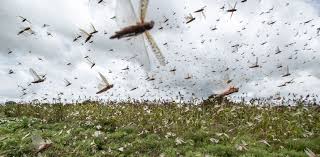Chinese team visits Tharparkar to help anti-locust drive

Karachi: A working group of Chinese experts surveyed Tharparkar in order to extend assistance to Pakistan to curb swarms of locusts that have destroyed crops across the country.
Talking to media Chinese experts said that their country will help Pakistan’s Plant Protection Department to eradicate swarms of plant eating locusts.
China will provide special spraying equipment and vehicles to Pakistan for use in eradication of the grasshoppers that have played havoc with standing crops and orchards across the country since last year, visiting Chinese experts said.
China will also provide drones to monitor the movement of locusts across the country.
Chinese Ambassador to Pakistan Yao Jing recently assured that his country will help Pakistan in combating swarms of locusts that have ravaged crops across the country.
Talking to Federal Minister for National Food Security and Research Makhdoom Khusro Bakhtiar in Islamabad, the ambassador assured to consider supply of pesticides and spraying equipment to Pakistan as an emergency project.
He said that the Chinese government will send a delegation of technical experts during next week to Pakistan to further deliberate on the matter.
The Ministry of National Food Security and Research recently announced that it has decided to declare a national emergency over locusts attack in parts of the country.
The ministry officials during a meeting of the National Assembly’s committee on agriculture, presided over by Speaker Asad Qaiser.
The ministry said that after a gap of 30 years, the locusts have once again attacked the country.
In June last year, swarms of locusts attacked cotton fields in Khairpur, Sukkur, and Ghotki in Sindh. Farmers had to bear losses of hundreds of thousands of rupees due to crop damage in the attack.
The United Nations’ Food and Agriculture Organisation (FAO) in first week of September had warned that the situation relating to locusts in Pakistan was “most serious” as a second generation of the insect had been bred.
According to the FAO’s Locust Watch report, there remains a risk of further breeding, causing locust numbers to increase, with the possibility of swarm formation from late September onward.
Yemen and India are also facing a similar situation, and the situation could deteriorate in Ethiopia and Eritrea, report added.





